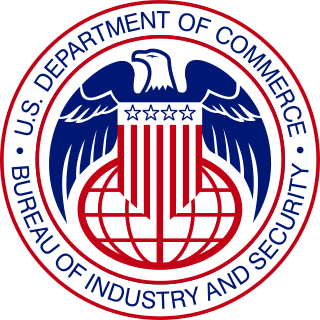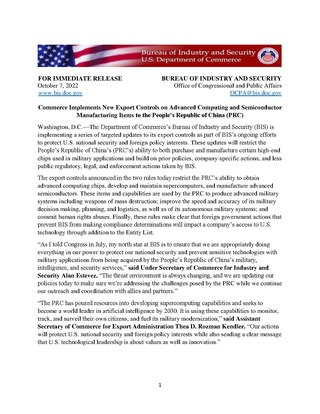
The Bureau of Industry and Security (BIS) is an agency of the United States Department of Commerce that deals with issues involving national security and high technology. A principal goal for the bureau is helping stop the proliferation of weapons of mass destruction, while furthering the growth of United States exports. The Bureau is led by the Under Secretary of Commerce for Industry and Security.
International Traffic in Arms Regulations (ITAR) is a United States regulatory regime to restrict and control the export of defense and military related technologies to safeguard U.S. national security and further U.S. foreign policy objectives.

Non-tariff barriers to trade are trade barriers that restrict imports or exports of goods or services through mechanisms other than the simple imposition of tariffs.

The export of cryptography from the United States to other countries has experienced various levels of restrictions over time. World War II illustrated that code-breaking and cryptography can play an integral part in national security and the ability to prosecute war. Changes in technology and the preservation of free speech have been competing factors in the regulation and constraint of cryptographic technologies for export.
The Export Administration Regulations (EAR) are a set of regulations found at 15 C.F.R. § 730 et seq. They are administered by the Bureau of Industry and Security, which is part of the US Commerce Department. The EAR regulates export and export restrictions: whether a person may export something from the U.S.; re-export something from a foreign country; or transfer something from one person to another in a foreign country. The EAR applies to physical objects - sometimes referred to as "commodities" - as well as intellectual property such as technology and software.
The TARIC code is designed to show the various rules applying to specific products when imported into the EU. This includes the provisions of the harmonised system and the combined nomenclature but also additional provisions specified in Community legislation such as tariff suspensions, tariff quotas and tariff preferences, which exist for the majority of the Community’s trading partners. In trade with third countries, the 10-digit Taric code must be used in customs and statistical declarations.
The Automated Export System (AES) is the system used by U.S. exporters to electronically declare their international exports, known as Electronic Export Information (EEI), to the Census Bureau to help compile U.S. export and trade statistics. This information is also shared with the Bureau of Industry and Security, the Directorate of Defense Trade Controls, and other federal agencies involved in monitoring and validating U.S. exports. Formerly this declaration was only made on paper on the Shipper's Export Declaration form.
Custom brokers or Customs House Brokerages are working positions that may be employed by or affiliated with freight forwarders, independent businesses, or shipping lines, importers, exporters, trade authorities, and customs brokerage firms.
Export restrictions, or a restriction on exportation, are limitations on the quantity of goods exported to a specific country or countries by a Government. Export restrictions could be aimed at achieving diverse policy objectives such as environmental protection, economic welfare, social wellbeing, conversion of natural resources, and controlling inflationary pressures. There are various forms of restrictions on export as defined by WTO’s Trade Policy Reviews (TPR), for example, export duties, quantitative restrictions, voluntary export restrictions, export prohibitions and licensing requirements. Although some countries apply export restriction of various policy purposes, restrictions on exports provide price advantage for the domestic industries because these restrictions create price difference between domestic goods compared to the price of the same goods to foreign investors. Export restrictions don’t always provide benefits for the country and more income for the government. In the field of agriculture and food sector export restrictions are aimed at protecting the domestic food security from international supply. During the food crises of 2007-2008, more than thirty countries imposed various export restriction measures such as quantitative export restrictions, prohibitions, export taxes, and price controls to protect the domestic food supply. However, this created additional pressures on the food crises by imposing high global prices and affecting the supply of food in the international market.
Taxation in Iran is levied and collected by the Iranian National Tax Administration under the Ministry of Finance and Economic Affairs of the Government of Iran. In 2008, about 55% of the government's budget came from oil and natural gas revenues, the rest from taxes and fees. An estimated 50% of Iran's GDP was exempt from taxes in FY 2004. There are virtually millions of people who do not pay taxes in Iran and hence operate outside the formal economy. The fiscal year begins on March 21 and ends on March 20 of the next year.

A Certificate of Origin or Declaration of Origin is a document widely used in international trade transactions which attests that the product listed therein has met certain criteria to be considered as originating in a particular country. A certificate of origin / declaration of origin is generally prepared and completed by the exporter or the manufacturer, and may be subject to official certification by an authorized third party. It is often submitted to a customs authority of the importing country to justify the product's eligibility for entry and/or its entitlement to preferential treatment. Guidelines for issuance of Certificates of Origin by chambers of commerce globally are issued by the International Chamber of Commerce.
Export control is legislation that regulates the export of goods, software and technology. Some items could potentially be useful for purposes that are contrary to the interest of the exporting country. These items are considered to be controlled. The export of controlled item is regulated to restrict the harmful use of those items. Many governments implement export controls. Typically, legislation lists and classifies the controlled items, classifies the destinations, and requires exporters to apply for a licence to a local government department.
Denied Trade Screening AKA: Denied Party Screening, Sanction Party Screening Denied Trade Lists: lists created and compiled by government authorities/agencies and/or organizations that warn its members/citizens/business to either beware or refrain from interacting with those individuals or entities on the lists. Further, these lists act as the foundation of establishing either notification or direct prohibition of those under the issuing authority not to contact or interact, either by communication or by business transactions or by social transactions. AKA: Denied Party Lists (DPL), Sanction Party Lists (SPL)
An identity verification service is used by businesses to ensure that users or customers provide information that is associated with the identity of a real person. The service may verify the authenticity of physical identity documents such as a drivers license, passport, or a nationally issued identity document through documentary verification. Additionally, also involve the verification of identity information (fields) against independent and authoritative sources, such as a credit bureau or proprietary government data.
The Office of Export Enforcement (OEE) is a part of the United States Department of Commerce, Bureau of Industry and Security.

Gun laws in Massachusetts regulate the sale, possession, and use of firearms and ammunition in the Commonwealth of Massachusetts in the United States. These laws are among the most restrictive in the entire country.

Attempts, unofficially dubbed the "Crypto Wars", have been made by the United States (US) and allied governments to limit the public's and foreign nations' access to cryptography strong enough to thwart decryption by national intelligence agencies, especially the National Security Agency (NSA).
Customs Regulations in Thailand is a combination of requirements affecting on import and export of production across the border of Thailand. Thailand has a system of “green” and “red corridor”. “Green corridor” can be used by person transferring goods which are not subject to a customs declaration. “Red corridor” is provided for persons transferring goods which are subject to a customs declaration. For instance, goods that should be paid by customs taxes, forbidden goods or goods that required a special authorization.
The Entity List is a trade restriction list published by the United States Department of Commerce's Bureau of Industry and Security (BIS), consisting of certain foreign persons, entities, or governments. Entities on the Entity List are subject to U.S. license requirements for the export or transfer of specified items, such as some U.S. technologies. However, U.S. persons or companies are not prohibited from purchasing items from a company on the Entity List. Being included on the Entities List is less severe than being designated a "Denied Person" and more severe than being placed on the Unverified List (UVL).

Effective October 7, 2022, the United States of America implemented new export controls targeting the People's Republic of China's (PRC) ability to access and develop advanced computing and semiconductor manufacturing items. The new export controls reflect the United States' ambition to counter the accelerating advancement of China's high-tech capabilities in these spaces to address foreign policy and national security concerns.




